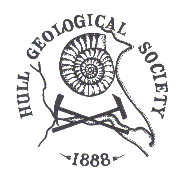
Hull Geological Society

August 2023
19
members and guests attended the “Introduction to East Yorkshire Geology from 250
ma BP to 2500 CE” by Mike Horne on Zoom.
12
members attended the field meeting at Keyingham. Stephen and Mike gave an
introduction to the Quaternary geology of Holderness and then Stephen guided us
around the site. Although there is little quarrying there at present Jim had dug
a pit in one corner of the site to expose the in situ gravels. We had the
opportunity to collect erratics from the stock heaps and shells from a reserve
from the southern pit. Stephen also displayed in the office some of the
quaternary vertebrate bones he had found on the site over the years.
Six
members attended the East Riding Boulder Committee meeting at Mappleton. The
following erratics were recorded in the cliff as we headed south – Chalk
(common), Magnesian Limestone, fine grained porphyry, basalt, yellow quartz,
coal, Carboniferous Limestone, Inoceramus,
ironstone, grey flint, pale grey mudstone, black flint, New Red Sandstone, pink
chalk, milky quartz, brown micaceous sandstone, pale orthoquartzite, Jurassic
belemnite, jasper, Arnioceras,
Grypheae, Res Chalk with
Neohibolites, red granite, grey
granite, green conglomerate, black shale, Kimmeridge Clay with ammonites. Some
of these were collected for the Type Erratics Collection at the University. We
also recorded from the beach – ammonite from the Speeton Clay, dogger, Jurassic
shelly limestone, Jurassic septarian nodule, Old Red Sandstone, Larvikite,
dolerite, microgranite, Middle Jurassic rootlet bed, Permian Cannon Ball
Limestone.
At the
Members’ Evening we proved that nostalgia is still what it used to be. There
were the following contributions from members –
Dennis
Haughey remembered the closure of the geology night classes at the University
and campaigning to try to keep them going.
Mike Horne remembered some early meetings – finding an Icthyosaur skull at Haswker Bottoms, strapping it on to Lynden Emery’s back and pushing him up the cliff; a winter walk from Bridlington to Hornsea with Ken Fenton past very cold nudists at Fraisthorpe; his first indoor as Secretary 39 years ago; a Roadshow in the Ferens Art Gallery.
Mary
Howard sent a written contribution remembering a trip to Dane’s Dyke led by Mike
and Rodger; and a trip to Mappleton where members offered friendly help and
advice.
Chris
Leach said that his neighbour Mavis “actively encouraged” him to join the HGS 30
years ago; he shared an interest in railway modelling with Lynden; as a
Quaternary scientist he appreciated a visit to North Ferriby where he saw “ice
wedge casts” and Rodger demonstrating glacitectonics on the Holderness Coast. He
said that the HGS was the “friendliest society” he knew
Graham
Evans said that he had not been a member so long; he had studied geology in the
University night classes and achieve an archaeology degree also through the
night classes at the University. He enjoys the Society field trips.
Brenda
and Jack had brought samples of rock salt and potash collected on the HGS visit
to Boulby Mine; they talked about the experience and showed a photo of the group
in their orange PPE.
Janet
Robson remembered a walk at Mappleton led by Rodger “he walked very fast”;
learning about beer vouchers, not to wear white trousers to Speeton and that
hard hats also offer protection from the birds depositing guano at Filey Brigg.
It was my daughter who first became a member of HGS, and
I used to drop her off at the university and then sit in the car and read a
book. Her enthusiasm started to rub off on me, however, and so I started to
attend once she went to university. I was worried that I would feel foolish for
not having much geology knowledge,
but everyone was (and still is) so generous with their knowledge and support.
Slowly I have been able to grasp basic concepts, and understand more about the
place I call home. That enlightenment now enhances every car journey, hilly
ramble and beach visit.
I recall my first two HGS field meetings. One was to the
beach at Danes Dyke, where Mike took us to the chalk face and enthused about it
not just being ‘white stuff’. Rodger
Connell then took us out to the shoreline and explained what the cliffs
represented. For the first time I had some idea of timelines, sequences and
processes, and became hooked.
The second meeting was to Mappleton, and I was fascinated
how those with the knowledge could experience a beach walk as a journey through
geological time. No matter how many times I trotted up to people and asked
‘what’s this?’ I was always met with enthusiasm and a willingness to encourage
my learning.
The HGS has given me a new hobby, that will last me for
the rest of my lifetime, and I hope to be able to support others to take an
interest in the subject.
Copyright - Hull Geological Society 2024
Registered Educational Charity No. 229147